First-years reflect on inaugural year of mandatory pre-orientation programs 
First-year students spoke to the News about their experience with the inaugural Camp Yale pre-orientation programs, which are mandatory and free for all students for the first time ever.

Zoe Berg, Photo Editor
This fall, first-year students were required to participate in one of the University’s six pre-orientation programs, marking the University’s new commitment towards making the Camp Yale programs more inclusive.
Before this year, pre-orientation programs were optional and students had to pay a fee to participate. The University announced its switch to mandatory, free programs last spring in an attempt to balance the initial arrival of first-years to campus — in 2021, a spike in interest in pre-orientation programs led to large groups of students arriving on campus at different times, separating those who participated in programs from those who did not.
“Making the programs mandatory and taking away the cost that has historically been charged to participate in the program has made it a much more equitable experience,” Jayanti Gupta ’26 said. “It is now an experience which all Yalies, regardless of financial status or other socioeconomic demographics, can participate in.”
For Gupta, the most important part of participating in a pre-orientation program is the chance to engage with fellow students on a deeper level than would be possible otherwise. Gupta said her experience in Cultural Connections was transformative, leaving her with lifelong friends and people to engage with on campus, making the first-year experience less intimidating.
Gupta’s pre-orientation program connected her with people who hold similar identities and backgrounds, which she said she especially valued because the University is a predominantly-white institution. Cultural Connections was the one thing that grounded her at Yale, Gupta said, giving her a community within an entirely new social and academic environment.
Annie Cui ’26 said she appreciated her pre-orientation program, FOOT, for allowing her to develop deep connections to people in a very vulnerable setting. In particular, she highlighted one of the program’s traditions: having every student give a “hometown,” or an in-depth recollection of their life story and background.
“I think living in the wilderness without showering, sleeping like sardines under a tent and living off tortillas really bonds people like no other,” Cui said. “My FOOT group met me in my dirtiest, most repulsive state, and still decided to be friends, which goes to show what a phenomenal bonding program it is.”
Issy Po ’26 saw her pre-orientation program, the Orientation for International Students, as an opportunity to become adjusted to the resources available at the University.
She also highlighted her program’s help in assisting her and other international students in their transition to life in a new country. The group bonding exercises connected Po with a group of friends and comforted her during times of anxiety during the move to Yale, she added.
“As an international student, it doesn’t feel like I am being forced to join a pre-orientation program,” Po said. “This is definitely a community I want to be a part of in the long-term, and I have definitely made some valuable connections that I believe will carry me through my Yale experience!”
The pre-orientation programs include Cultural Connections, BUILD, FOCUS, FOOT, OIS, and Harvest. The BUILD program centers around the chance for students to create virtual computer programs and technological objects. The FOCUS program is dedicated to local activism and community service and takes place in New Haven — and generated some criticism over its projects with local service groups. The FOOT program is a four day backpacking trip through the northeastern mountains. OIS serves to help adjust foreign students into life and school in the United States, and the Harvest program seeks to familiarize students with agriculture and outdoor activities in a farming setting in Connecticut.
Not all students were at ease with the idea of being mandated to join a pre orientation program. For Cui, the requirement was intimidating and unclear.
“I felt a mix of anxiety and excitement going into pre-orientation,” Cui said. “I wasn’t quite sure what the four days would entail –– all I knew was that I would be backpacking for the first time ever with complete strangers somewhere in the Appalachians.”
The pre-orientation programs split students into small groups, each led by a student leader.







